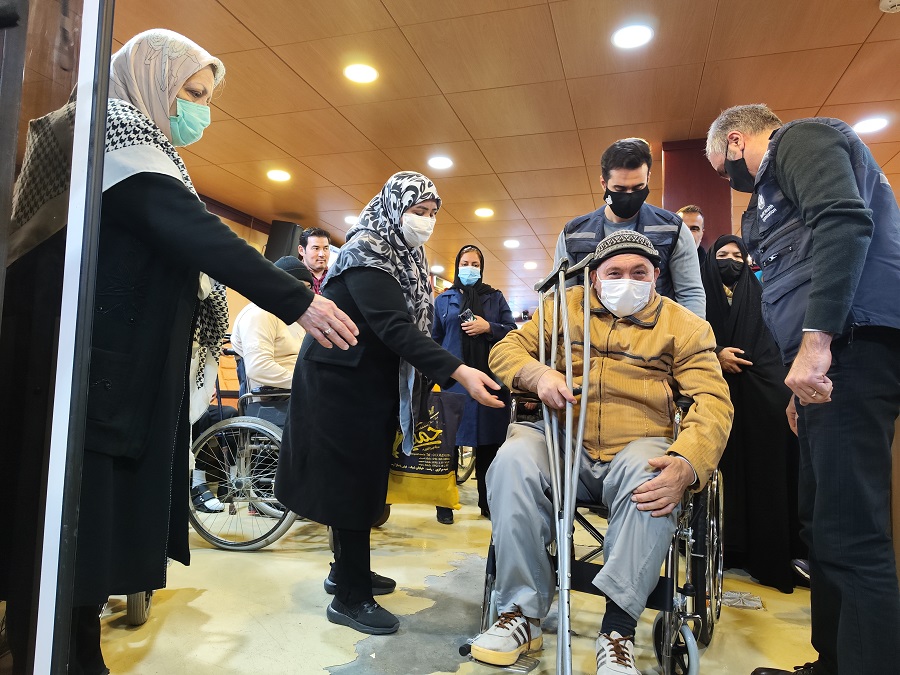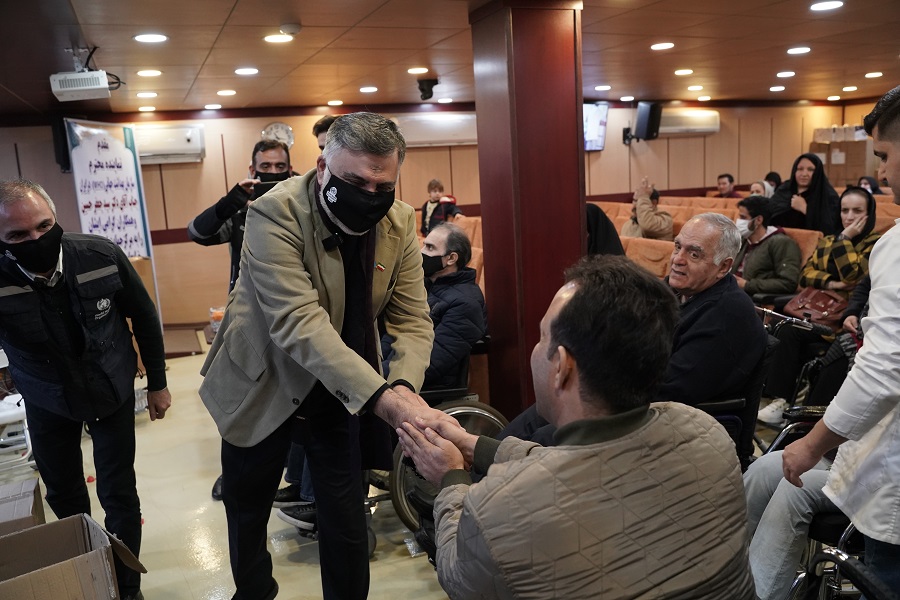 A refugee living with a spinal cord injury is being assisted by the project team with the wheelchair donated at the Association for the Protection of People with Spinal Cord Disabilities
A refugee living with a spinal cord injury is being assisted by the project team with the wheelchair donated at the Association for the Protection of People with Spinal Cord Disabilities
26 February 2023 – In its continuous efforts to extend health services to those most in need, the World Health Organization (WHO) has just begun distributing assistive technology and adaptive tools procured within a project co-funded by WHO, the European Union, and the Government of Canada, in line with goal to achieve “Health for All by All.”
The project, “Improving access to inclusive healthcare services for the elderly and people living with disabilities during COVID-19 in Iran,” was launched in 2021 and is set to provide 1000 assistive technology tools for 961 identified individuals across 15 provinces, prioritizing low-income households and people with severe disabilities, including refugees.
“This project would not be possible without the support and dedication of local nongovernmental organizations (NGOs), especially the Association for Protection of People with Spinal Cord Disabilities. These NGOs, as members of the steering committee, helped the project goals become more equitable, inclusive, and comprehensive,” said Dr Syed Jaffar Hussain, WHO Representative and Head of Mission to the Islamic Republic of Iran, at the donation ceremony held 29 January.
The steering committee of the project acts as an effective platform for community engagement and data-driven decision-making. The involvement of such organizations helps facilitate the identification of the most vulnerable groups and contributes to data sharing and coordination among partners.
The Director of the Association for Protection of People with Spinal Cord Disabilities Ms Yarmohammadi elaborated on the details of the collaboration between WHO and the Association and highlighted the important role of NGOs in ensuring more inclusive and equitable results.
“NGOs participated in developing the list of prioritized individuals who were in urgent need of assistive technologies. Even though they were not registered in the national registry or had just recently suffered spinal cord injuries, we shortlisted 27 persons with severe disabilities so they would receive assistance sooner,” she explained.
Dr Hussain reiterated that WHO would continue its support by securing funding for the expansion of these activities and the provision of assistive technologies while “the lessons learned during the current project as a successful example can enrich our future collaborations.”
 Dr Syed Jaffar Hussain greets a guest in the donation ceremony at the Association for the Protection of People with Spinal Cord Disabilities
Dr Syed Jaffar Hussain greets a guest in the donation ceremony at the Association for the Protection of People with Spinal Cord Disabilities
WHO is currently contributing to the development of a collaborative network to provide services for older people and people with disabilities. The UN’s leading health agency supports utilizing local capacities and cross-sectoral collaboration to achieve health and well-being for all. It encourages partners to consider this collaboration only as a starting point for bigger partnerships with even more impactful results.
Note for editors
The European Union and its Member States are the world’s leading donor of humanitarian aid. Through its Civil Protection and Humanitarian Aid Operations department (ECHO), the European Union helps millions of victims of conflict and disasters every year. With headquarters in Brussels and a global network of field offices, the EU provides assistance to the most vulnerable people on the basis of humanitarian needs.




